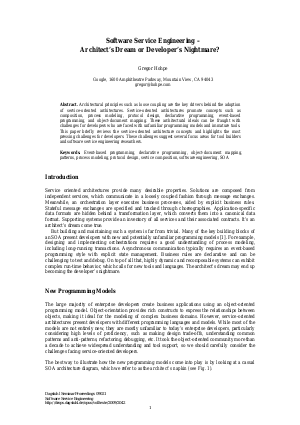Software Service Engineering - Architect's Dream or Developer's Nightmare?
Author Gregor Hohpe
-
Part of:
Volume:
Dagstuhl Seminar Proceedings, Volume 9021
Part of: Series: Dagstuhl Seminar Proceedings (DagSemProc) - License:
 Creative Commons Attribution 4.0 International license
Creative Commons Attribution 4.0 International license
- Publication Date: 2009-07-06
File

PDF
DagSemProc.09021.6.pdf
- Filesize: 96 kB
- 5 pages
Document Identifiers
Subject Classification
Keywords
- Event-based programming
- declarative programming
- object-document mapping
- patterns
- process modeling
- protocol design
- service composition
- software
Metrics
- Access Statistics
-
Total Accesses (updated on a weekly basis)
0PDF Downloads0Metadata Views
Abstract
Architectural principles such as loose coupling are the key drivers behind the adoption of service-oriented architectures. Service-oriented architectures promote concepts such as composition, process modeling, protocol design, declarative programming, event-based programming, and object-document mapping. These architectural ideals can be fraught with challenges for developers who are faced with unfamiliar programming models and immature tools. This paper briefly reviews the service-oriented architecture concepts and highlights the most pressing challenges for developers. These challenges suggest several focus areas for tool builders and software service engineering researchers.
Cite As Get BibTex
Gregor Hohpe. Software Service Engineering - Architect's Dream or Developer's Nightmare?. In Software Service Engineering. Dagstuhl Seminar Proceedings, Volume 9021, pp. 1-5, Schloss Dagstuhl – Leibniz-Zentrum für Informatik (2009)
https://doi.org/10.4230/DagSemProc.09021.6
BibTex
@InProceedings{hohpe:DagSemProc.09021.6,
author = {Hohpe, Gregor},
title = {{Software Service Engineering - Architect's Dream or Developer's Nightmare?}},
booktitle = {Software Service Engineering},
pages = {1--5},
series = {Dagstuhl Seminar Proceedings (DagSemProc)},
ISSN = {1862-4405},
year = {2009},
volume = {9021},
editor = {Frank Leymann and Tony Shan and Willen-Jan van den Heuvel and Olaf Zimmermann},
publisher = {Schloss Dagstuhl -- Leibniz-Zentrum f{\"u}r Informatik},
address = {Dagstuhl, Germany},
URL = {https://drops.dagstuhl.de/entities/document/10.4230/DagSemProc.09021.6},
URN = {urn:nbn:de:0030-drops-20423},
doi = {10.4230/DagSemProc.09021.6},
annote = {Keywords: Event-based programming, declarative programming, object-document mapping, patterns, process modeling, protocol design, service composition, software}
}
